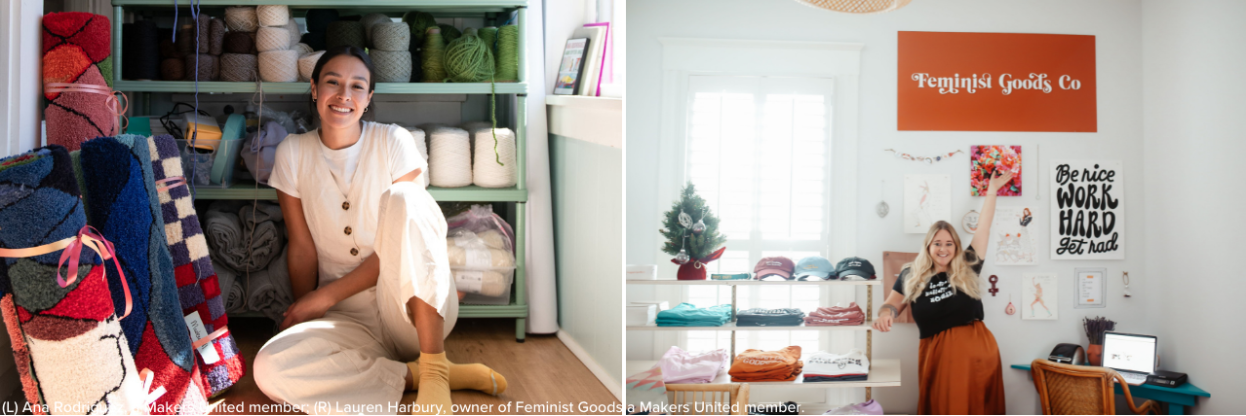The Impact of Makers United To Expand Across the Country in 2022
Photos from the Birmingham Holiday Maker Market.
Since the launch of Makers United, our flagship domestic programming, in 2019, Nest has gathered the impact data from program participants. Over the last quarter, we analyzed this dataset and the results speak for themselves.
From supporting 128 makers during the program launch in Birmingham, Alabama, in 2019, the Makers United program has grown to serve 1,032 entrepreneurs with maker businesses employing 9,145 individuals across 36 states in the United States and Puerto Rico. And fulfilling the program’s mission to advance diversity and inclusion in the burgeoning American Makers’ Movement, 93% of those entrepreneurs identify as women and/or Black, Indigenous, and People of Color (BIPOC), and this includes 686 women makers and 391 BIPOC makers.
These include makers like Alaine Hutson, founder and owner of Social Justice Jewelry, an Austin-based accessories business. At the end of 2020, Alaine was close to shuttering Social Justice Jewelry after Covid-19 caused a major slowdown in sales and market opportunities. Through her participation in Makers United, however, she was awarded a Covid-19 relief grant and a recoverable grant through the Nest Revolving Maker Fund Supported by the Tory Burch Foundation. With this financial support, she was able to purchase materials to produce additional inventory and kickstart her direct-to-consumer presence on Instagram, as well as Wolf & Badger a global retail platform that is enabling her to connect with buyers from around the world. Today, her business is alive and thriving, and she plans to hire part-time production support to keep up with increased orders.
Our latest analysis also found that almost three-quarters of makers (73%) shared that Nest’s programs have increased their opportunities for revenue since joining the Makers United network, and more than half (59%) shared that this has resulted from engagement in just the last year. Additionally, 9 out of 10 makers reported an increase in their confidence in growing their business.
Across the subset of businesses who shared that Nest’s programs had increased their opportunities for revenue, our impact data also revealed that between 2020 to 2021, these businesses experienced an average increase in revenue of over +43%. Additionally, we learned that our work to increase market linkages for BIPOC makers is highly effective. BIPOC makers experienced a +48% increase in revenue (as compared to non-BIPOC makers who experienced a +40% increase). BIPOC makers participating in Makers United programming also appeared to be more resilient throughout the pandemic and experienced a +43% increase in revenue in 2020, as compared to non-BIPOC makers experienced a -13% decline in revenue in 2020.
(L) Ana Rodriguez a Makers United member; (R) Lauren Harbury, owner of Feminist Goods a Makers United member.
All of these learnings are evidence that Makers United is impactful and effective, and that the broad spectrum of capacity building and market access programming it includes is achieving the goals we set for ourselves when we developed the program in 2018. After our America the Beautiful Convening in Charleston, South Carolina, that brought together local artists and makers from the Southeast, as well as corporate, philanthropic, and community leaders, Nest engaged with creative entrepreneurs who shared the challenges they face in growing and sustaining their craft-based businesses. The primary issue they raised was that access to the rapidly growing Makers’ Movement and the social and economic opportunities it offers were not shared equitably within communities and were often split by race and class.
With those learnings in hand, Nest developed and launched Makers United in Birmingham, Alabama, in 2019. Since then the program has expanded to 7 cities and two heritage craft communities: the Gee’s Bend quilters of Alabama, and the Gullah basket weavers of the South Carolina Lowcountry. In each location, Nest works with local program managers to lead a landscape mapping process that identifies key challenges and opportunities for local makers. From there, we design corresponding programming to address these issues and set makers up for long-term success, and leverage our growing network of brand and corporate partners to create meaningful market opportunities for program participants.
In addition to these localized programs, Nest welcomes artists, makers, and creative entrepreneurs from across the country into Makers United and the Nest Artisan & Maker Guild where they can access a growing library of free, expert-led business development resources and be considered for market opportunities like the Madewell x Nest Hometown Heroes Collective or a feature through Amazon Handmade.
Over the last three years, the size of the Makers United network has increased by +189% and will continue to grow as we kick off programming in Houston, Indianapolis, and Chicago this year. With funding from a grant through Houston Community College, Nest has completed the landscape mapping process and begun delivering in-person and virtual workshops to makers in the community. And, generous local philanthropists in Indianapolis and Chicago have committed the funding to begin the landscape mapping in these cities later this summer.



